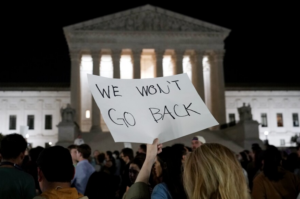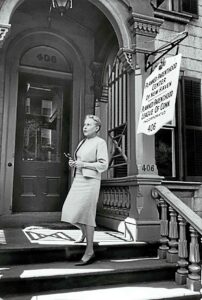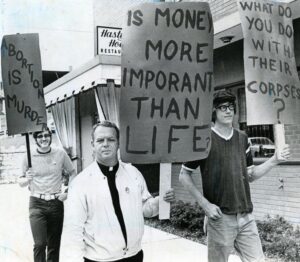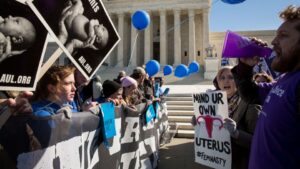“Our Bodies, Ourselves”, Experiencing the Impact of Roe v. Wade
By Jade Heenehan
“Women had finally won control of their bodies in the crucial realm of reproduction” (H. W. Brands, American Dreams, p. 180)

Pro-abortion protest outside of the Supreme Court in Washington D.C. on May 2, 2022 (Photo by Alex Brandon, AP Photo)
For the past few nights, pro-choice protestors have been flocking to the steps of the U.S. Supreme Court in Washington, D.C. They were reacting to a draft majority opinion from the Court that was leaked on May 2, 2022. The leaked preliminary opinion would overturn the court’s landmark 1973 Roe v. Wade (often shortened to Roe) decision. Justice Samuel Alito, the author of the preliminary opinion, claims Roe “was egregiously wrong from the start.”[1] At least four out of eight other justices agree with Alito. Many women are remembering the debate, and backlash, over being given control over their own bodies nearly 50 years ago when Roe was decided and abortion was legalized throughout the U.S. These women that have experienced the ruling are now, 49 years later, watching the possible overturning of Roe.
When Roe passed in early 1973, my mother, Roxanne M. Rudy was 17 years old and living in Hartford, Conn. Briefly mentioned in H. W. Brands’ book, American Dreams, the Roe decision was seen as women finally gaining control over their bodies.[2] However, as Brands mentions, there was controversy about this decision that continues to this day.[3] There were many protests against abortion and reproductive health clinics like Planned Parenthood in Hartford. While growing up, she came to believe women should have a choice over their bodies. Rudy didn’t understand why “nobody else had seen the light.”[4] Despite being a liberal city and the state capital, not every Hartford resident agreed with the Roe decision. Rudy recounted how after the decision; her Catholic high school had tried to have “everyone sign a petition saying how awful Roe v. Wade was.”[5] The Roman Catholic Church, and thus Rudy’s school, has long taught abortion is a mortal sin. Rudy quietly did not sign the petition, and no one noticed, but many other students did.[6] Although many girls would later benefit from the Roe decision, they were still signing the petition, perhaps due to how they were raised, or from the pressure from their teachers and/or peers.

Estelle Griswold in front of Planned Parenthood in New Haven, CT (Photo courtesy of New Haven Register)
Like Rudy, there were those who supported women being allowed control over their reproductive systems. A year before Roe, a Gallop Poll found that 64% of Americans believed “the decision to have an abortion should be made solely by the woman and her physician.”[7] In the 1960s, many organizations were trying to decriminalize abortion. They were fighting against statutes enacted by legislatures, many over 100 years old.[8] A national movement had yet to develop, but four states – New York, Alaska, Hawaii, and Washington – had begun to repeal their abortion laws.[9] But these four states represented only a small portion of the nation’s popular opinion.
There were times when the two sides over reproductive rights came to a clash. The polarization over the Roe decision has helped to split parties and the country even further apart. Nearly 40 years after the Roe decision, David Brooks, a conservative New York Times columnist, claimed the decision’s author, Justice Harry Blackmun, “did more inadvertent damage to our democracy than any other 20th-century American.”[10] There were anti-abortion protesters calling for Planned Parenthood to shut down. Despite the other family planning and women’s health resources, Planned Parenthood provides, “it was seen as the group that brings abortion into your community.”[11] There have been many disputes between Planned Parenthood and Republican-controlled state governments. Republicans often tried to cut – and often succeeded in cutting – funding to Planned Parenthood in an effort to shut it down.[12] Republicans, like President Donald Trump, declared “I want to defund [Planned Parenthood] because of the abortion factor.”[13] However, closing Planned Parenthood removes access to other reproductive and healthcare benefits like access to oral conception, pap smears, and “just anything that had to do with women’s health.”[14] Although abortion is one of Planned Parenthood’s services, many detractors see it as the only service it provides.
A year after the Roe decision, Rudy attended a counter-protest to keep open Hartford’s Planned Parenthood clinic. After the Roe decision, Planned Parenthood “angered people” and the efforts to close Planned Parenthood increased.[15] Threats were sent to Planned Parenthood workers daily and screamed at when they entered and left work. “Murderer” can often be heard being yelled at by protestors at Planned Parenthood workers and visitors. At the protest, Rudy recalls being “scared out of my mind.”[16] The atmosphere was tense, and nerves were on edge. Many people were screaming and shoving. The fear Rudy felt that day makes her think that “even though they said they really respected life, … if they could have, they would’ve hit any one of us with a two-by-four across the forehead.”[17] The atmosphere was hostile and threatening, and while rocks and paint were thrown at opponents, the violence was minor and no one was injured.
Words were not the only way to express people’s beliefs at the Hartford protest. Many people wielded signs to further their cause. Some anti-abortion protestors “have these pictures of [what they claimed] an aborted fetus looked like but the kid looked like he was ready for kindergarten.”[18] Rudy didn’t carry any signs but many others did to further support their cause. Pro-choice members chanted “our bodies, ourselves,” taken from a book title[19]. Written in 1970 by the Boston Women

A priest and fellow anti-abortion protestors outside the Reproductive Health Services in Missouri (Photo courtesy of St. Louis Post-Dispatch)
Health Book Collective, Our Bodies, Ourselves mentions many female reproductive health topics like menstruation, pregnancy, and even abortion.[20] Similar to the chant used today, “my body, my choice,” this saying was used to support the idea that a woman should be in control of her own reproductive system, often against anti-abortion groups.
The Hartford protest was mostly peaceful but things were still thrown. Rocks were thrown from both sides as emotions ran higher during the anti-choice protest. It further escalated when anti-abortion protestors threw paint at the pro-choice demonstrators. Rudy quipped that “paint stores did really well in their red paint [sales] for the weeks to come.”[21] The paint represented the blood of the fetuses killed by abortion. Anti-abortionists “would throw red paint, [say] ‘you’re murdering,’ ‘murder,’ ‘blood on your hands,’” Rudy recalled.[22] Emotions and anxiety were running high between the two sides and continued to until the Hartford Police came and told the crowd to disperse.[23]
Now 66, Rudy is watching as control over her – and now her daughters’ – reproductive rights are being decided again. Pro-choice protests have been happening more frequently as anti-abortion laws are passed in areas like Texas and Missouri. There were also Women’s Marches that began in January 2017, when President Trump took office, to protest his victory in the election. During these Women’s Marches, Planned Parenthood volunteers and workers often marched and waved signs to show support for women and pro-choice laws. Although Rudy has not been a volunteer with Planned Parenthood for over 20 years, she still vehemently supports their cause. Seeing the right to abortion being discussed once again, Rudy believes “we are going to see a lot of tragedy.”[24]

Anti-abortion and pro-choice protestors clash in front of the Supreme Court, 2016 (Photo courtesy of CNN)
The importance of Roe v. Wade is briefly touched upon in Brands’ book. The controversy Brands foresaw is truly being seen now as political parties are even more polarized than before.[25] The split between them is making abortion more a fight between parties than beliefs. This division has increased tensions and led to more intense violence during protests. In the 1970s, Rudy “pretty much knew [anti-abortion protestors] were going to call me names, yell, and throw paint at me, maybe a rock or two.”[26] But recently there has been an “upsurge in violent crimes, in people driving their cars into groups of protestors, the proliferation of handguns.”[27] Rudy says that she “would think twice” to protest but fears the nation will be going back in time.[28] Showing public support for pro-choice laws to state legislatures and the Congress is necessary to defend – and perhaps soon, restore – women’s rights to their bodies.
Fifty years later, as reluctant as she might be, Rudy might have re-fight a battle she, like so many others, thought was won and settled long ago. Now she is looking to once again return to protest against anti-abortion groups to help keep choice an option. Or to restore it for many women, if the Supreme Court votes to overturn Roe, as is widely expected.
Footnotes
Interview subject
Roxanne Rudy, age 65, retired ESL and special needs teacher. A former volunteer at Planned Parenthood in Fort Worth, Texas during the 1970s.
- Audio recording with Roxanne Rudy, Madison, NJ, April 23, 2022
Q: What was it like growing up in Hartford, Connecticut?
A: At that time, in the 1960s, 1970s Hartford was, and obviously still is, the capital of Connecticut. It was, as I recall it, a great place to grow up. There were neighborhoods that were very distinct. There were neighborhoods where a lot of people were immigrants. It was a town of growing immigration. There were Ukrainians, which is what I [am]… It was very much a city dominated by [Catholics]. Most of the people I knew, the mothers stayed home, and the fathers went to work. A lot of people were blue collar workers, some were white collar workers. But generally speaking, it was, what we consider to be a traditional neighborhood, traditional families.
Q: So, you talked about how Hartford, Connecticut was conservative. How do you think that played into Roe v. Wade after it occurred?
A: Well for a lot of people it got them very worked up because suddenly women could have abortions, which didn’t translate as something that could potentially save a woman’s life or save whatever. It was “oh my gosh, women have now been on this rampage to the women’s movement. Now they have the pill and now they have an abortion. Oh my gosh, everything that has been considered proper is going to fall apart.” However, in my family, it was not that way. As I look back, my family was probably a little bit different… My mother in many ways was a traditional woman, she was very religious… [But] she said, what had always bothered her was at that time, women’s worth was what their uteruses could produce. She said that’s a bunch of nonsense. My grandfather was absolutely determined that his daughter would have a college education, which she got, and he made certain from the day that my sister was born, and a few years later, when I was born, that he had set up a bank account to make sure that at least some money would be set aside for our college educations.
Q: So that’s your personal experience. How do you think your community’s experience was?
A: My community’s experience was not good, as far as I was concerned. The experience was not good, as far as I was concerned, as far as I knew I should say. In 1973 I was in high school. I went to public schools for elementary school but … I went to a Catholic high school and when Roe v Wade came out, shortly after there was this activity or whatever in the high school to have everyone sign a petition saying how awful Roe v. Wade was. I thought “wait a minute, I’m not going to sign this”, and I didn’t.
Q: Was the topic abortion, even before Roe v. Wade, a taboo topic that wasn’t discussed?
A: Oh absolutely, yes. That was a taboo topic, sex was a taboo topic. In 1966, … there was no such thing as planning your children. At that time, it was not uncommon that some of my classmates had 9, 10, 11 siblings.
Q: After Roe v. Wade happened, now that abortion was brought under public scrutiny, how did Hartford react?
A: There were a lot of Catholics, and birth control was absolutely forbidden. Yes, we had a couple of colleges there, which you would’ve thought added to the progressive attitude but even when I got to college, in 1974/75, [abortion] was still whispered about… You had the law, but in my opinion, 85% of the community was still astounded that sex could be discussed.
Q: After Roe v. Wade happened, do you think there was more push to close Planned Parenthoods?
A: Oh, definitely! The whole idea that Planned Parenthood was coming into communities [angered people], it didn’t matter that it offered any other number of reproductive health services from pap smears to just anything that had to do with women’s health. It was seen as the group that brings abortion into your community.
Q: Which Planned Parenthood did you do your counter protest at?
A: In Hartford, when I was a freshman in college. One of the women that I worked for, her daughter, several years older than me, was a nurse at a Planned Parenthood. I remember that this women, on several occasions, was extremely worried for her daughter’s safety. They would regularly get phone calls [saying] “you’re going to be bombed”, “you’re going to be burned down”, “all you murders are going to die today”.
Q: At your counterprotest, did you see anyone that you recognized? Either protesting [against Planned Parenthood] or counterprotesting?
A: I didn’t no, mostly because I was scared out of my mind. The protesters looked really mean, they looked like they really wanted to hurt us. Even though they said they really respected life, I think if they could have, they would’ve hit anyone of us with a 2×4 [plank] across the forehead and not cared if we died. It was truly scary.
Q: What were some things that the protesters were saying to your counterprotest or just Planned Parenthood in general?
A: Murders. [Also] that Planned Parenthood encouraged sluts; they might have said encouraged loose behavior… If you were going to Planned Parenthood, supported Planned Parenthood, believed that it should exist, you were a murder. It didn’t matter, we needed to be stop. Even the idea of birth control, the idea that you could prevent a pregnancy so that abortion wouldn’t be needed was wrong.
Q: So, you said you were scared, and it was terrifying. Did anything ever get thrown? Were there signs?
A: Oh yes! They would have these pictures of [what they claimed] an aborted fetus looked like but the kid looked like he was ready for kindergarten. It was ridiculous. But it didn’t matter because emotions were running high. Yeah, they threw things. They threw rocks, paint. That was a big thing, the paint stores did really well in their red paint for the weeks to come. They would throw red paint, [say] “you’re murdering”, “murder”, “blood on your hands”, “when you stand before the throne of God, you’re going to have to answer for you standing in front of Planned Parenthood doors”. It was really emotional. It was emotional and vicious… [The protestors] would grab you and shuffle you. I remember a woman walking by on the street and they grabbed her. She was like “what are you doing?! I’m going to work”. She wasn’t even trying to get into Planned Parenthood. That is how high the emotions were. There was no logic and reason.
Q: You were so vehement for pro-choice due to how you were raised. Do you think this is just how people were raised?
A: I do, absolutely. It really is because I think it becomes part of your identity. For some people I suppose it was some sort of Heaven-sent crusade. But I think a lot of people, like my friends in high school, ever gave it much thought. They were taught that it was wrong, and it was wrong.
Q: Since Roe v. Wade has been an impact in the states so much, now that areas like Texas and Missouri, are putting their own laws on abortion, how do you think this will impact society?
A: I think we are going to see a lot of tragedy. I think we are going to go back to the day of self-induced abortions, which is never a good idea. I think we are going to see an uptick in young women, mid to late teens, having children and trying to raise them when they are in no position to raise them much less finish school themselves. I think we are going to see an uptick in children being raised in single family [homes] or poverty which is going to affect us for generations to come. I think we are going to go back in time.
Q: Do you think that the fear and terror you felt when you were protesting will be replicated with the new youth now after anti-abortion laws are passed?
A: Yes. I think we’ve reached a point in our society where extreme violence is the norm. When I stood in front of the abortion clinic in 1973/74, I pretty much knew they were going to call me names, yell, and throw paint at me, maybe a rock or two. But I never thought anything worse was going to happen, even though they kind of looked like they wanted to when I look back and I was scared. Nowadays, I have to say, I would think twice. With the upsurge in violent crimes, in people driving their cars into groups of protestors, the proliferation of handguns. I fear for this.
Q: You said your chant back in the mid-1970s was “our bodies, ourselves”, how do you think it has changed to “my body, my choice”?
A: I think it is basically the same. It is a little bit different but still the same. My body, my choice. If I want to have this baby, I will. If I want to prevent a pregnancy, I will. If I want to have sex, I will. I will make an informed decision, I am not incapable, I am not a child, and I know what to do. I think it is about time that everyone realize that.
- Email interview with Roxanne Rudy, May 11, 2022
Q: Were there any repercussions since you did not sign the petition for your school?
A: I don’t think so. It was passed around in class, so I sort of just handed it on to the next kid without signing it. No one noticed that I didn’t! If I was Roman Catholic and it was passed around in Church, I definitely wouldn’t have been able to get away without signing it. But no, no one noticed that I didn’t sign it, so nothing happened.
Q: How did the protest in Hartford end?
A: Eventually, after a few hours, the police politely told everyone it was time to call it a day and that we needed to disperse. Which we did.
